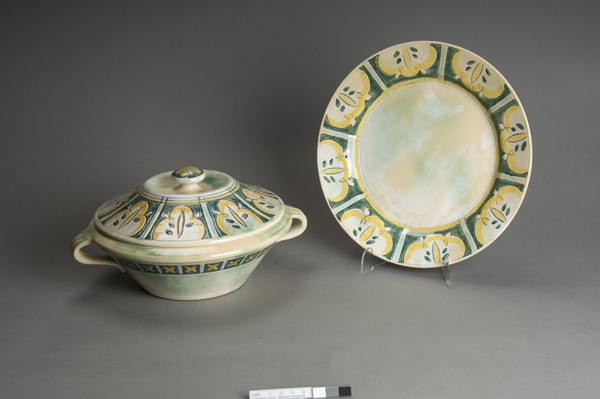
This vegetable dish and plate, c. 1930 were designed by Sir Frank Branwyn RA (1867-1956) and made at the Royal Doulton factory, Staffordshire. Brangwyn was born in Bruges to an English father who was an ecclesiastical designer and cabinet maker, and a Welsh mother. When the family returned to London in 1882, Brangwyn became an apprentice draughtsman to William Morris and without any formal fine art training he became recognised as an independent artist. In 1885, aged 17, his first painting was accepted by the Royal Academy. He was also a prolific print maker, illustrator and designer producing designs for furniture, carpets and ceramics.
Brangwyn ware was popular 1930-1940. Doulton approached Brangwyn to create a range of tableware and other designs for them. He designed a pattern for this dinner service in 1930 which continued to be made for some time. He created the design but specified that the factory painters decorating the pieces be allowed some freedom in interpreting his designs.
Royal Doulton was founded in 1815 operating from Vauxhall and Lambeth, London before it opened a factory in Burslem, Stoke on Trent. From 1853 to 1901, its wares were marked Doulton & Co., then as Royal Doulton from 1901 when a royal warrant was given. It was one of the first British makers of art pottery with an interest in decorative wares.
Many European and British museums have benefited from a donation by Brangwyn including Bangor University which was gifted a modest collection of watercolours, drawings, prints and books from him shortly before his death. These are in Bangor University Archives and Special Collection. Storiel also has an oil painting ‘Carnarvon Castle’ by Brangwyn dated 1880s.
An exhibition of Brangwyn’s etchings, lithographs and wood engravings are on display at Storiel 29 June -28 September 2024.
